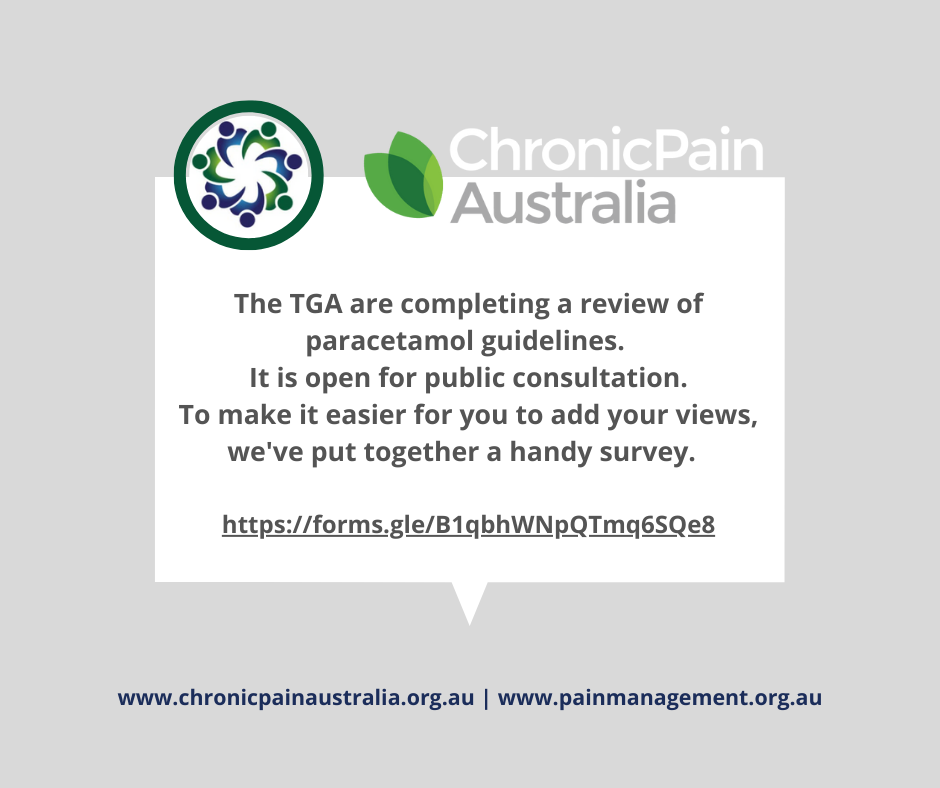Legislation and Updates in Chronic Pain
-

Our response to monitored medicines
In February 2023, APMA worked with Health Consumers Queensland and Chronic Pain Australia on a joint submission in response to the monitored medicines system in QLD.
-

TGA Submission for the proposed changes to Paracetamol
Submission from Chronic Pain Australia & APMA re: the proposed amendments to the Poisons Standard in relation to paracetamol.
-

APMA & The Pain Toolkit - Media Release
The Australian Pain Management Association is proud to announce the exclusive Australian rights to The Pain Toolkit.
-
Medicare Benefit Schedule Updates
From 1 March 2022, some of the MBS items for pain management services are changing to align with contemporary best practice. The changes are a result of the MBS Review Taskforce recommendations for pain management and extensive consultation with stakeholders.
-

AIWH Chronic Pain in Australia
This report provides insight into the experience of Australians managing chronic pain. It explores the latest national data on the proportion of people with chronic pain, as well as its impact, treatment and management.
-

National Action Plan
The National Pain Strategy has been a catalyst for major change in the way pain—especially chronic pain—is understood and managed in Australia and the provision of pain services.
-

Working with chronic pain – what are my rights?
Most of us probably think that pain resulting from an injury or illness will be resolved after accessing medical treatment or once the injury has healed. Unfortunately, this is not the case for many people who suffer an ongoing type of pain called chronic pain.
-

Medical device patient information leaflets and implant cards
From 1 December 2021, suppliers of implantable medical devices are required to have patient information materials available in the form of Patient Information Cards (PIC) and Patient Information Leaflets (PIL). These information materials provide patients and medical practitioners with important information about specific implantable medical devices.
The PIC is used to record the details of the specific device that a patient has implanted – including the name of the device, the manufacturer, the model and batch number and who to contact if they experience any issues. The details on the card can be recorded in patient electronic records, discharge summaries or if a physical card, be carried by the patient in their wallet. The information recorded on the card enables improved traceability of the device if there are any issues or recalls. Many suppliers of medical devices already provide these cards (eg: pace-makers and spinal rods) that patients display when having MRIs’ or go through airport security screening.
The PIL offers a source of information that can be used to inform discussions on the decision to implant a type of medical device. Leaflets should be available prior to surgery to assist patient-doctor discussions regarding the type of medical device being considered and the type of medical condition the device is used for. The leaflet may also be used to provide patients with the name and manufacturer of the device, information about what may happen after the surgery, and information about possible adverse events and malfunctions.
-

NSW Pain Management Report
The NSW Pain Management Report - Report of the NSW Pain Management Taskforce, outlines the Taskforce’s recommendations to develop and support a state-wide system of pain management services by focussing on integrating multidisciplinary care across primary, secondary and tertiary services; education, training and workforce development for health professionals in all disciplines; research and evaluation; community-wide strategies to reduce the stigma of chronic pain; and better access to early intervention.
-
Pain Concern - Pain at Work Toolkit
Although this is a UK resource, there are loads of great points included to help people discuss pain with their employers.




